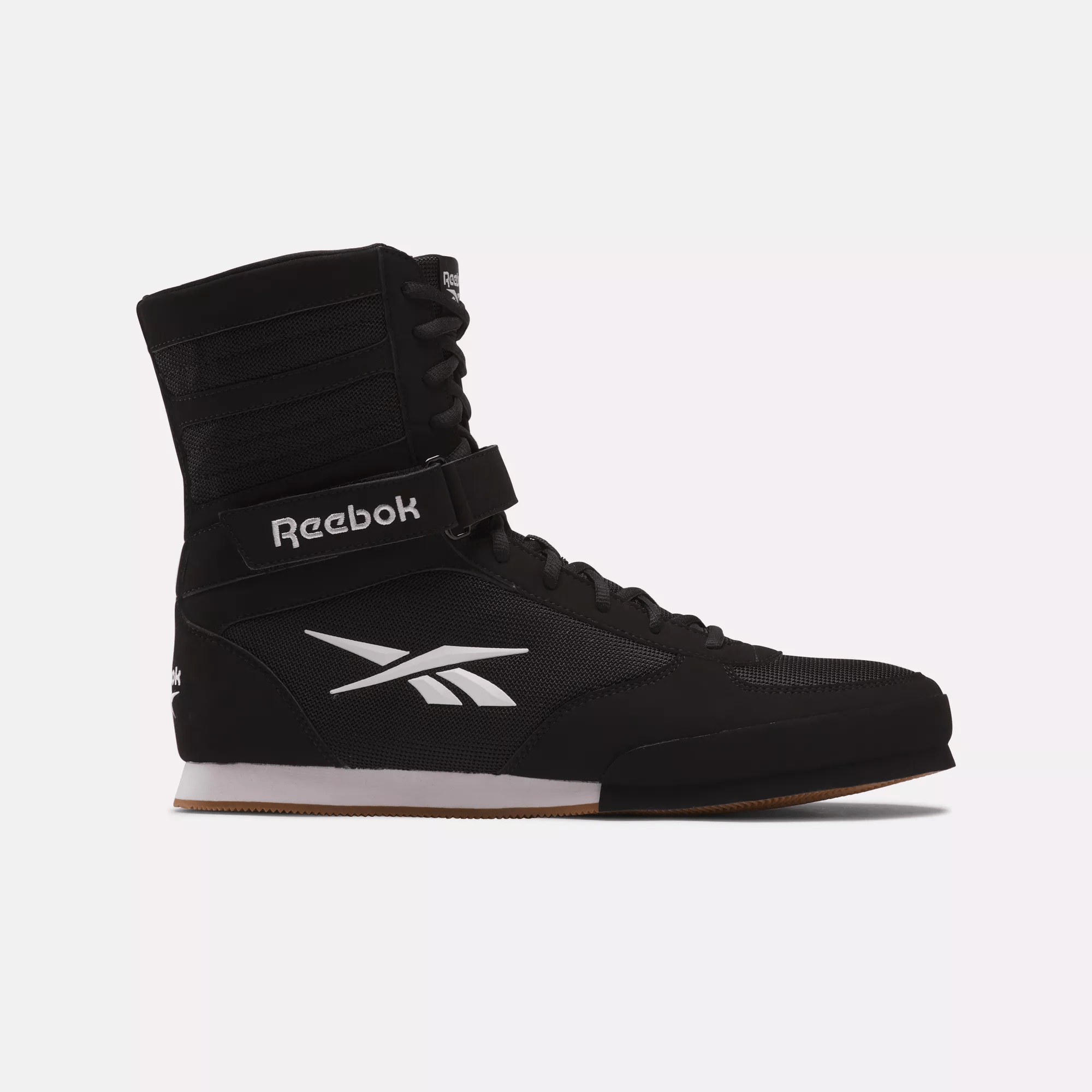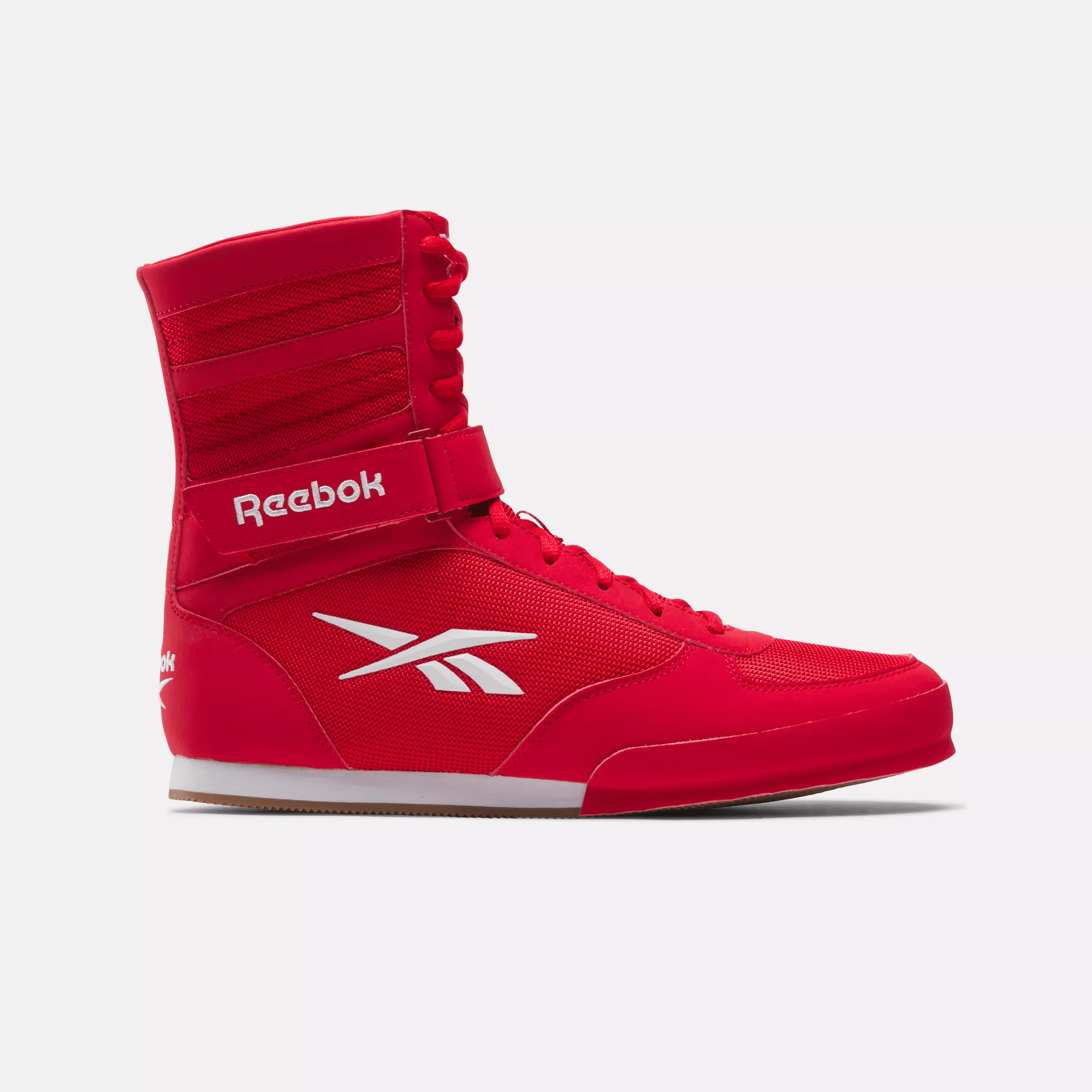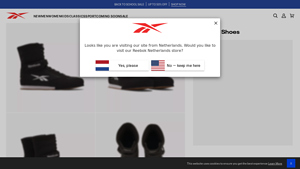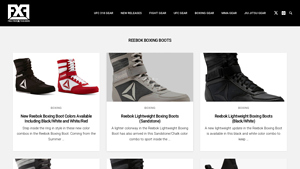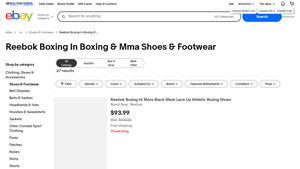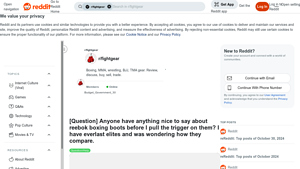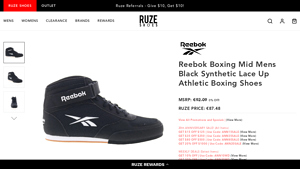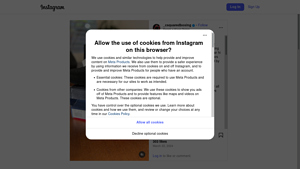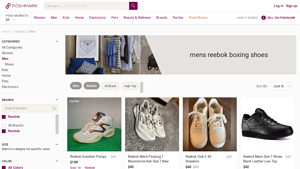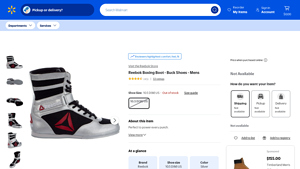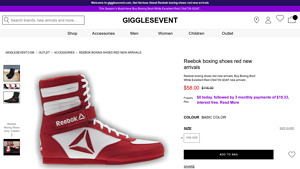Reebok Boxing Shoes Guide: Type,Cost,Material…
Introduction: Navigating the Global Market for reebok boxing shoes
In today’s competitive landscape, sourcing Reebok boxing shoes that meet both performance and comfort standards presents a significant challenge for international B2B buyers. With a rising demand for high-quality athletic footwear across diverse markets, including Africa, South America, the Middle East, and Europe, it is crucial to navigate the complexities of product selection effectively. This guide serves as a comprehensive resource, addressing key aspects such as the various types of Reebok boxing shoes available, their specific applications for different boxing styles, and strategies for vetting suppliers to ensure reliability and quality.
Understanding the nuances of pricing and cost structures is equally important, as it can significantly impact procurement decisions. By providing insights into market trends, product specifications, and supplier evaluations, this guide empowers B2B buyers to make informed purchasing decisions that align with their operational needs and budget constraints.
Whether you are looking to stock your retail outlet in Nigeria or Brazil with the latest Reebok boxing shoes or planning to equip a boxing gym in Europe, this resource will enhance your sourcing strategy. By leveraging the information within this guide, businesses can confidently navigate the global market for Reebok boxing shoes, ensuring they offer their customers the best in performance and style.
Understanding reebok boxing shoes Types and Variations
| Type Name | Key Distinguishing Features | Primary B2B Applications | Brief Pros & Cons for Buyers |
|---|---|---|---|
| Boxing Hi Shoes | High top design, breathable mesh upper, ankle strap | Competitive boxing training, professional gyms | Pros: Enhanced ankle support; superior grip. Cons: May limit mobility for some users. |
| Boxing Mid Shoes | Mid-top design, lightweight synthetic material | Casual training, amateur boxing | Pros: Balanced support; versatile for various workouts. Cons: Less ankle support than high tops. |
| Reebok x Shakur Stevenson Line | Unique collaborations, stylish designs, performance focus | Fashion-forward gyms, youth training | Pros: Trendy appeal; high performance. Cons: Potentially higher price point. |
| Training Shoes | Versatile design for multiple sports, cushioned soles | Cross-training, multi-sport facilities | Pros: All-purpose functionality; comfortable for varied activities. Cons: May lack specialized features for boxing. |
| Lightweight Sparring Shoes | Minimalist design, flexible construction | Sparring sessions, lightweight training | Pros: Enhanced agility; lightweight feel. Cons: Less protection for the feet during heavy training. |
What Are the Key Characteristics of Reebok Boxing Hi Shoes?
Reebok Boxing Hi Shoes are characterized by their high-top design, providing exceptional ankle support crucial for boxers during intense training and matches. The breathable mesh upper ensures ventilation, while suede overlays add durability. These shoes are particularly suitable for competitive boxing environments where stability and grip are paramount. B2B buyers should consider these shoes for professional gyms and training centers focusing on serious boxing athletes.
How Do Boxing Mid Shoes Differ in Design and Functionality?
Boxing Mid Shoes offer a more versatile option with a mid-top design that balances support and flexibility. They are constructed from lightweight synthetic materials, making them suitable for casual training and amateur boxing. These shoes are ideal for B2B buyers looking to cater to a broader audience, including those who may engage in various athletic activities. The trade-off is that while they offer decent support, they do not provide the same level of ankle stability as the high-top models.
What Makes the Reebok x Shakur Stevenson Line Stand Out?
The Reebok x Shakur Stevenson line features unique collaborations that blend style with performance. These shoes are designed for those who want to make a statement while training. They appeal to a younger demographic and are perfect for fashion-forward gyms. B2B buyers should consider this line for retail opportunities, as they can attract customers looking for trendy yet functional boxing footwear. However, the higher price point may limit accessibility for some buyers.
Why Should Businesses Consider Reebok Training Shoes?
Reebok Training Shoes are designed for versatility, making them suitable for various sports and training regimens. Their cushioned soles provide comfort during extended workouts, appealing to fitness centers that offer cross-training programs. B2B buyers can benefit from stocking these shoes as they cater to a wide range of athletic needs. However, businesses should note that these shoes may lack the specialized features required for serious boxing training.
What Are the Advantages of Lightweight Sparring Shoes?
Lightweight Sparring Shoes focus on flexibility and minimalism, allowing athletes to move quickly and freely. This design is particularly beneficial during sparring sessions where agility is crucial. B2B buyers should consider these shoes for training environments that emphasize speed and lightness. However, it’s essential to note that while they enhance agility, they may offer less protection than heavier training shoes during rigorous boxing activities.
Key Industrial Applications of reebok boxing shoes
| Industry/Sector | Specific Application of Reebok Boxing Shoes | Value/Benefit for the Business | Key Sourcing Considerations for this Application |
|---|---|---|---|
| Sports Training Centers | Used for boxing training and sparring sessions | Enhances athlete performance through comfort and support | Need for bulk orders, sizing options, and durability |
| Retail and E-commerce | Resale of boxing shoes as part of sports apparel collections | Expands product range, appealing to boxing enthusiasts | Consideration for brand reputation, shipping logistics |
| Fitness and Wellness | Integrated into fitness programs for boxing and cardio workouts | Increases engagement and retention in fitness classes | Demand forecasting, seasonal trends, and promotional strategies |
| Martial Arts Schools | Utilized in martial arts training and competitions | Offers specialized footwear, improving grip and stability | Quality assurance, compliance with competition standards |
| Sports Equipment Distributors | Distribution of boxing shoes to gyms and training facilities | Establishes partnerships and diversifies product offerings | Negotiation on pricing, inventory management, and delivery timelines |
How Are Reebok Boxing Shoes Used in Sports Training Centers?
In sports training centers, Reebok boxing shoes are essential for athletes during training and sparring sessions. The high-top design provides ankle support, while the breathable materials enhance comfort during intense workouts. These shoes help solve the problem of inadequate foot stability, which can lead to injuries. Buyers in this sector should consider bulk order capabilities, a variety of sizes, and the shoes’ durability to withstand rigorous training conditions.
What Role Do Reebok Boxing Shoes Play in Retail and E-commerce?
Retailers and e-commerce platforms can leverage Reebok boxing shoes as part of their sports apparel collections. By offering these popular shoes, they can attract boxing enthusiasts and fitness aficionados alike. The resale of high-quality, branded footwear enhances the retailer’s product range and drives sales. Key considerations for these buyers include brand reputation, shipping logistics, and the ability to manage inventory effectively to meet consumer demand.
How Do Reebok Boxing Shoes Benefit Fitness and Wellness Programs?
Fitness and wellness centers often incorporate boxing workouts into their fitness programs, utilizing Reebok boxing shoes for their classes. These shoes enhance participant experience by providing optimal comfort and support, thereby increasing class engagement and retention. When sourcing these products, fitness centers must consider demand forecasting, seasonal trends, and effective promotional strategies to maximize participation rates.
In What Ways Are Reebok Boxing Shoes Used in Martial Arts Schools?
Martial arts schools utilize Reebok boxing shoes to enhance training and competition performance. The shoes offer specialized features that improve grip and stability, essential for executing complex movements and techniques. Buyers in this field need to ensure that the footwear meets quality assurance standards and complies with any relevant competition regulations, which can vary by region and discipline.
How Do Sports Equipment Distributors Benefit from Reebok Boxing Shoes?
Sports equipment distributors can expand their offerings by including Reebok boxing shoes in their catalogs, catering to gyms and training facilities. This diversification helps establish strong partnerships within the sports community. Distributors should focus on negotiating favorable pricing, managing inventory efficiently, and ensuring timely delivery to maintain strong relationships with their customers and enhance sales opportunities.
3 Common User Pain Points for ‘reebok boxing shoes’ & Their Solutions
Scenario 1: Sizing Challenges When Ordering Reebok Boxing Shoes for Teams
The Problem: A B2B buyer responsible for outfitting a boxing gym or a sports team often faces the challenge of accurately sizing Reebok boxing shoes for multiple athletes. Misjudging sizes can lead to excess returns, wasted resources, and dissatisfied athletes. This issue is exacerbated when dealing with international shipping, where return processes can be lengthy and costly. Additionally, the lack of a standardized sizing chart across different brands can further complicate the ordering process.
The Solution: To mitigate sizing issues, B2B buyers should invest time in compiling comprehensive sizing data from their athletes before placing bulk orders. This can involve conducting a fitting session where each athlete tries on a sample pair of Reebok boxing shoes, ensuring they understand the brand’s unique fit. It’s also advisable to refer to Reebok’s official sizing charts and guidelines, which can be found on their website. For larger orders, consider reaching out directly to Reebok or authorized distributors for assistance in determining the best sizes based on athlete feedback. Additionally, incorporating a flexible return policy into your purchasing agreement can help reduce the financial impact of any sizing errors.
Scenario 2: Managing Inventory Levels of Reebok Boxing Shoes
The Problem: For B2B buyers, managing inventory levels of Reebok boxing shoes can be a significant challenge, especially in regions with fluctuating demand. Over-ordering can lead to surplus stock that may not sell, while under-ordering can result in missed sales opportunities and dissatisfied customers. This situation is often compounded by the need for timely restocking, particularly in peak training seasons or before major competitions.
The Solution: Implementing an effective inventory management system tailored for sporting goods can help buyers better forecast demand for Reebok boxing shoes. Utilize sales data, seasonal trends, and athlete feedback to create a dynamic inventory strategy. For instance, consider using software that tracks sales patterns and alerts you to reorder levels based on real-time data. Additionally, establishing a partnership with Reebok or its distributors can provide insights into upcoming releases and allow for pre-order options, ensuring timely access to new models and sizes. This proactive approach can enhance customer satisfaction and streamline inventory turnover.
Scenario 3: Addressing Quality Concerns in Reebok Boxing Shoes
The Problem: B2B buyers, particularly in markets with diverse economic conditions, may encounter quality concerns regarding the durability and performance of Reebok boxing shoes. These concerns can arise from athletes reporting wear and tear after limited use or from discrepancies in product quality when sourced from different suppliers. Such issues not only affect athlete performance but can also tarnish the buyer’s reputation if athletes do not receive expected quality.
The Solution: To address quality concerns, buyers should prioritize sourcing directly from authorized Reebok distributors or the company itself. This ensures that all products meet the brand’s quality standards. Additionally, conducting regular quality audits on received inventory can help catch any issues before they reach the athletes. Establishing a feedback loop with athletes regarding the performance of their shoes can also be beneficial. Regularly review this feedback to identify common issues and communicate these to suppliers for resolution. Furthermore, consider investing in a warranty or satisfaction guarantee program to reassure athletes of the shoe’s quality and durability, thereby enhancing overall trust in the brand.
Strategic Material Selection Guide for reebok boxing shoes
What Are the Key Materials Used in Reebok Boxing Shoes?
Reebok boxing shoes are designed to provide optimal performance, comfort, and durability for athletes. The choice of materials plays a crucial role in achieving these objectives. Below is an analysis of common materials used in Reebok boxing shoes, focusing on their properties, advantages, disadvantages, and considerations for international B2B buyers.
1. Breathable Mesh
Key Properties:
Breathable mesh is lightweight and allows for excellent airflow, which helps regulate temperature during intense physical activity. It typically has a low-pressure rating but is effective in moisture management.
Pros & Cons:
The primary advantage of breathable mesh is its lightweight nature and comfort, making it suitable for prolonged use. However, it may lack durability compared to other materials and can be susceptible to wear and tear over time, especially in high-impact environments.
Impact on Application:
Breathable mesh is ideal for applications requiring flexibility and ventilation, making it suitable for boxing training and competition. However, it may not be the best choice for outdoor use in harsh weather conditions.
Considerations for International Buyers:
Buyers in regions like Africa and South America should consider local climate conditions when selecting breathable mesh shoes. Compliance with international standards for breathability and moisture management can also be a factor.
2. Suede Overlays
Key Properties:
Suede overlays provide additional support and durability, enhancing the shoe’s overall structure. They are resistant to abrasion but can absorb moisture, which may affect performance in wet conditions.
Pros & Cons:
The key advantage of suede is its ability to provide a premium look and feel, along with added durability. However, it requires more maintenance than synthetic materials and can be more expensive due to the sourcing of quality suede.
Impact on Application:
Suede overlays are particularly beneficial in applications where additional support is needed, such as in high-intensity training sessions. However, they may not be suitable for environments with high humidity or exposure to water.
Considerations for International Buyers:
Buyers should be aware of the sourcing and treatment processes for suede, as these may vary by region. Compliance with environmental standards regarding leather products is also essential, especially in Europe.
3. Synthetic Materials
Key Properties:
Synthetic materials are engineered to provide high durability and resistance to wear and tear. They often have good temperature resistance and can be engineered for specific performance characteristics.
Pros & Cons:
The main advantage of synthetic materials is their durability and lower cost compared to natural materials. However, they may not offer the same level of breathability and comfort as mesh or suede.
Impact on Application:
Synthetic materials are well-suited for high-impact sports like boxing, where durability is paramount. They can withstand rigorous training and competition conditions, making them a popular choice.
Considerations for International Buyers:
Buyers should ensure that synthetic materials meet local regulations regarding chemical use and environmental impact. Understanding the manufacturing processes and certifications can help in selecting compliant products.
4. Rubber Outsoles
Key Properties:
Rubber outsoles provide excellent traction and grip, essential for maintaining stability during movement. They are highly resistant to wear and can perform well in various environmental conditions.
Pros & Cons:
The primary advantage of rubber outsoles is their durability and ability to provide a secure grip. However, they can add weight to the shoe, which may affect performance for some athletes.
Impact on Application:
Rubber outsoles are ideal for boxing shoes, where quick movements and stability are crucial. They perform well on various surfaces, making them versatile for different training environments.
Considerations for International Buyers:
Buyers should be aware of local regulations regarding rubber sourcing and environmental impact. Ensuring compliance with standards such as ASTM for slip resistance can enhance product acceptance in various markets.
Summary Table of Material Selection for Reebok Boxing Shoes
| Material | Typical Use Case for Reebok Boxing Shoes | Key Advantage | Key Disadvantage/Limitation | Relative Cost (Low/Med/High) |
|---|---|---|---|---|
| Breathable Mesh | Training and competition | Lightweight and comfortable | Less durable, prone to wear | Medium |
| Suede Overlays | High-intensity training | Premium look and added support | Requires maintenance, higher cost | High |
| Synthetic Materials | General boxing applications | Durable and cost-effective | Less breathable | Low |
| Rubber Outsoles | Stability and traction in boxing | Excellent grip and durability | Can add weight | Medium |
This analysis provides valuable insights into the materials used in Reebok boxing shoes, helping international B2B buyers make informed purchasing decisions based on performance, durability, and regional considerations.
In-depth Look: Manufacturing Processes and Quality Assurance for reebok boxing shoes
What Are the Key Stages in the Manufacturing Process of Reebok Boxing Shoes?
The manufacturing of Reebok boxing shoes is a meticulous process that ensures high performance and durability, essential for athletes. This process can be broken down into four main stages: material preparation, forming, assembly, and finishing.
Material Preparation: What Materials Are Used and How Are They Prepared?
The first stage involves selecting high-quality materials designed to enhance performance and comfort. Common materials include breathable mesh for the upper, synthetic leather for durability, and rubber for the outsole.
Once materials are selected, they undergo a rigorous preparation process. This includes cutting the fabrics to precise dimensions, treating materials to enhance their performance characteristics (such as water resistance or breathability), and inspecting them for defects. Properly prepared materials are crucial, as they directly affect the shoe’s performance during use.
How Are Reebok Boxing Shoes Formed?
Forming is where the shoe begins to take shape. This stage typically involves several techniques, including molding and stitching. The upper part of the shoe is formed by stitching together the mesh and synthetic leather components. This step is critical for creating a locked-down fit, which is essential for stability during boxing activities.
The soles are usually manufactured using injection molding, a technique that allows for precise control over the material’s density and flexibility. This ensures that the shoes maintain a low stack height, providing the user with a better connection to the ground, enhancing agility and speed.
What Happens During the Assembly of Reebok Boxing Shoes?
The assembly stage combines all the components into a finished product. This includes attaching the upper to the sole, adding features such as ankle straps, and ensuring all elements are securely fastened. Reebok employs advanced assembly techniques that focus on efficiency without compromising quality.
Quality checks are interwoven throughout the assembly process. Workers conduct inspections at various points to ensure that each shoe meets the required specifications. This stage is vital as it guarantees that any defects can be caught and rectified early.
How Are Reebok Boxing Shoes Finished and Prepared for Market?
Finishing involves final touches to ensure the shoes are ready for retail. This includes cleaning, polishing, and packaging. Each pair is carefully inspected to meet strict quality standards before being packaged for distribution.
The finishing process also includes labeling, which must comply with international standards and regulations, ensuring that all necessary information is available for consumers and retailers alike.
What Quality Assurance Standards Are Followed in Reebok Boxing Shoe Manufacturing?
Reebok adheres to various international and industry-specific quality assurance standards to ensure their boxing shoes meet the highest quality expectations. One of the primary standards is ISO 9001, which emphasizes a systematic approach to quality management and continuous improvement.
How Do International Standards Affect Quality Control in Manufacturing?
International standards like ISO 9001 set the framework for quality management systems, which help in ensuring consistent quality in products. Reebok’s compliance with these standards indicates a commitment to quality, which is crucial for B2B buyers looking to invest in reliable products.
Additionally, industry-specific certifications, such as CE marking (Conformité Européenne), provide assurance that the products meet safety and performance standards within the European market. Other standards, such as API (American Petroleum Institute) specifications, may apply depending on the intended use of the shoes, particularly in environments where safety is paramount.
What Are the Key Quality Control Checkpoints in Reebok’s Manufacturing Process?
Quality control (QC) is an integral part of the manufacturing process, with several checkpoints established to ensure that each stage meets quality standards.
What Are IQC, IPQC, and FQC in Quality Control?
-
Incoming Quality Control (IQC): This is the first checkpoint where raw materials and components are inspected upon arrival at the manufacturing facility. The focus is on verifying that materials meet the specified standards and are free from defects.
-
In-Process Quality Control (IPQC): During the manufacturing process, periodic inspections are conducted to ensure that the production is adhering to quality standards. This includes monitoring the stitching, forming, and assembly stages to catch any issues before the final product is created.
-
Final Quality Control (FQC): Before the shoes are packaged for shipment, a final inspection is performed. This includes checking for any cosmetic defects, ensuring all components are securely attached, and verifying that the shoes meet performance specifications.
What Common Testing Methods Are Used to Ensure Quality in Reebok Boxing Shoes?
Reebok employs various testing methods to ensure the functionality and durability of their boxing shoes. These methods include:
-
Performance Testing: Shoes are subjected to wear tests to evaluate their durability and performance under typical boxing conditions. This helps ensure they can withstand the rigors of training and competition.
-
Material Testing: Various tests are conducted on materials to assess their breathability, flexibility, and resistance to wear and tear.
-
Safety Testing: Compliance with safety standards is crucial, and shoes are tested for slip resistance and other safety features to ensure they protect the athlete during use.
How Can B2B Buyers Verify Supplier Quality Control Processes?
For B2B buyers, especially those operating in regions like Africa, South America, the Middle East, and Europe, verifying a supplier’s quality control processes is essential.
What Steps Can Buyers Take to Ensure Quality Assurance?
-
Conduct Audits: Regular audits of suppliers can help buyers assess their compliance with quality standards. This includes reviewing their manufacturing processes and QC checkpoints.
-
Request Quality Reports: Buyers should request detailed quality assurance reports from suppliers, showcasing their adherence to international standards and any testing results.
-
Third-Party Inspections: Engaging third-party inspection services can provide an unbiased assessment of the supplier’s quality control processes and final products.
What Are the Unique QC Considerations for International B2B Buyers?
International buyers must also be aware of specific nuances when it comes to quality control. Different regions may have varying standards and regulations that need to be considered.
How Can Buyers Navigate These Challenges?
Understanding local regulations and compliance requirements is crucial. Buyers should engage with local experts or consultants who can provide insights into the necessary certifications and quality expectations within their region. This knowledge can significantly enhance the buyer’s ability to select reliable suppliers and ensure that the products meet both local and international standards.
In conclusion, the manufacturing processes and quality assurance of Reebok boxing shoes are designed to ensure that athletes receive high-performance products. B2B buyers must take proactive steps to verify supplier quality, understand international standards, and navigate regional nuances to make informed purchasing decisions.
Practical Sourcing Guide: A Step-by-Step Checklist for ‘reebok boxing shoes’
This practical sourcing guide provides B2B buyers with a clear checklist for procuring Reebok boxing shoes, ensuring a streamlined purchasing process that meets specific requirements. By following these steps, buyers can effectively identify reliable suppliers and secure high-quality products that align with their business needs.
Step 1: Define Your Technical Specifications
Before initiating the sourcing process, establish clear technical specifications for the boxing shoes you intend to purchase. Consider factors such as size range, color options, materials (like breathable mesh and suede), and specific features (e.g., ankle straps for support). Defining these criteria helps to ensure that the shoes meet the performance needs of athletes and comply with local regulations.
Step 2: Research Market Trends and Demand
Understanding current market trends and consumer preferences is crucial for making informed purchasing decisions. Analyze sales data, customer feedback, and competitive offerings to gauge which Reebok boxing shoes are in demand. This insight will not only guide your selection but also help in negotiating better pricing and terms with suppliers.
Step 3: Evaluate Potential Suppliers
Thoroughly vet suppliers before making a commitment. Request detailed company profiles, product catalogs, and references from other businesses in your industry. Look for suppliers with a proven track record in delivering quality Reebok products, as well as those who understand your specific market, whether it be in Africa, South America, the Middle East, or Europe.
Step 4: Verify Supplier Certifications and Compliance
Ensure that your chosen suppliers comply with relevant industry standards and certifications. This may include quality management certifications (e.g., ISO 9001) or compliance with safety regulations in your target market. Verifying these credentials protects your business from potential legal issues and enhances your credibility with customers.
Step 5: Request Samples for Evaluation
Before finalizing your order, request samples of the Reebok boxing shoes to assess quality firsthand. Evaluate the craftsmanship, comfort, and overall fit of the shoes. This step is critical, as it allows you to ensure that the products meet your specifications and will satisfy your customers’ expectations.
Step 6: Negotiate Terms and Pricing
Once you have identified a suitable supplier, engage in negotiations regarding pricing, payment terms, and delivery schedules. Be transparent about your expected order volumes and potential for repeat business. A mutually beneficial agreement can lead to better pricing and improved service, which is essential for maintaining competitive advantage.
Step 7: Establish a Logistics Plan
Finally, develop a logistics plan to manage the shipping and handling of your order. Consider factors such as shipping costs, delivery times, and customs regulations in your target market. An effective logistics strategy will ensure timely delivery of your Reebok boxing shoes, helping you to maintain stock levels and meet customer demands.
By following this checklist, B2B buyers can navigate the procurement process for Reebok boxing shoes with confidence, ensuring they secure the best products for their market while building strong supplier relationships.
Comprehensive Cost and Pricing Analysis for reebok boxing shoes Sourcing
What Are the Key Cost Components for Sourcing Reebok Boxing Shoes?
When sourcing Reebok boxing shoes, understanding the cost structure is crucial for B2B buyers. The primary cost components include materials, labor, manufacturing overhead, tooling, quality control (QC), logistics, and supplier margin.
-
Materials: The shoes are typically made from a combination of breathable mesh, suede overlays, and synthetic materials. The choice of materials impacts the overall cost significantly. High-performance materials may lead to higher prices but offer better durability and comfort.
-
Labor: Labor costs can vary depending on the manufacturing location. Regions with higher labor rates, such as Europe, may see increased costs compared to countries in Asia or South America where labor is less expensive.
-
Manufacturing Overhead: This includes costs related to utilities, equipment maintenance, and factory rent. Efficient production processes can help keep these costs down.
-
Tooling: Initial investments in molds and machinery are necessary for production. These costs are amortized over the volume of units produced, making them less significant for larger orders.
-
Quality Control (QC): Implementing rigorous QC processes ensures that the shoes meet safety and performance standards. While this adds to the cost, it is essential for maintaining brand integrity.
-
Logistics: Shipping and handling costs can vary greatly based on the destination. International shipping may involve additional tariffs and duties, which should be factored into the total cost.
-
Margin: Supplier margins will also influence the final pricing. Understanding the competitive landscape can help buyers identify fair pricing.
How Do Price Influencers Impact the Sourcing of Reebok Boxing Shoes?
Several factors influence the pricing of Reebok boxing shoes, particularly for international B2B buyers.
-
Volume/MOQ: Minimum Order Quantities (MOQs) often dictate pricing. Larger orders typically reduce per-unit costs, making them more economical for buyers.
-
Specifications/Customization: Custom designs or specific colorways can increase costs. Buyers should weigh the benefits of customization against potential price hikes.
-
Materials and Quality Certifications: The inclusion of premium materials or certifications (such as ISO standards) can justify higher prices. Buyers should evaluate the trade-offs between quality and cost.
-
Supplier Factors: The reputation and reliability of suppliers can affect pricing. Established suppliers may command higher prices due to their proven track record.
-
Incoterms: Understanding shipping terms is vital. Different Incoterms (e.g., FOB, CIF) can affect overall costs and should be clearly defined in contracts.
What Are the Best Buyer Tips for Negotiating Pricing on Reebok Boxing Shoes?
B2B buyers should employ strategic approaches to ensure cost-efficiency when sourcing Reebok boxing shoes.
-
Negotiation Strategies: Always be prepared to negotiate. Understanding the cost components and market rates can provide leverage during discussions.
-
Total Cost of Ownership (TCO): Consider not just the purchase price but the entire lifecycle cost, including shipping, storage, and potential returns. A lower initial price might lead to higher long-term costs.
-
Pricing Nuances for International Buyers: Buyers from Africa, South America, the Middle East, and Europe should be aware of currency fluctuations, trade agreements, and local tariffs that could impact pricing.
-
Research and Comparison: Conduct thorough market research to compare prices and terms from multiple suppliers. This can reveal trends and help in making informed decisions.
-
Building Relationships: Establishing long-term relationships with suppliers can lead to better pricing and terms over time. Loyal customers may receive discounts or preferential treatment.
Disclaimer on Indicative Prices
It is important to note that prices can fluctuate based on market conditions, demand, and other external factors. The prices discussed in this analysis are indicative and may vary significantly depending on the specifics of the order and the supplier’s pricing strategy. Always consult with suppliers for the most accurate pricing information.
Alternatives Analysis: Comparing reebok boxing shoes With Other Solutions
Exploring Alternatives to Reebok Boxing Shoes for Optimal Performance
In the competitive landscape of boxing footwear, various options are available that cater to the needs of athletes and trainers alike. While Reebok boxing shoes are well-regarded for their design and performance, it’s essential for B2B buyers to consider alternative solutions that may better align with specific requirements or budgets. This analysis compares Reebok boxing shoes against two viable alternatives: Adidas Adizero Boxing Shoes and Nike HyperKO Boxing Shoes.
| Comparison Aspect | Reebok Boxing Shoes | Adidas Adizero Boxing Shoes | Nike HyperKO Boxing Shoes |
|---|---|---|---|
| Performance | High top design for ankle support and stability; excellent grip and lightweight feel. | Lightweight and flexible; designed for speed and agility, but less ankle support. | Superior cushioning and support; designed for both speed and stability. |
| Cost | Mid-range pricing, typically around $100-$150. | Similar price range, generally $120-$160. | Higher price point, typically $160-$200. |
| Ease of Implementation | Easy to find in major sports retail outlets and online. | Widely available but may require pre-order in certain regions. | Limited availability; often requires specialized retailers. |
| Maintenance | Machine washable; durable materials ensure longevity. | Requires careful cleaning to maintain appearance; less durable than Reebok. | Easy to clean but may show wear faster due to lightweight materials. |
| Best Use Case | Ideal for training and competitive boxing; great for athletes needing ankle support. | Best suited for speed-oriented training and lighter sparring sessions. | Excellent for competitive bouts where cushioning and support are critical. |
Detailed Breakdown of Alternatives
Adidas Adizero Boxing Shoes
The Adidas Adizero is designed with agility in mind, making it a favorite for boxers who prioritize speed. Its lightweight construction allows for quick foot movement, which can enhance performance in the ring. However, the trade-off is reduced ankle support compared to Reebok shoes, which may be a concern for athletes prone to ankle injuries. The price point is competitive, but availability can vary, especially in specific markets.
Nike HyperKO Boxing Shoes
Nike’s HyperKO model is renowned for its exceptional cushioning and support, making it a solid choice for boxers who need reliable performance during intense bouts. The shoe’s design integrates advanced technology to provide both stability and comfort. However, it comes with a higher price tag, which may be a consideration for budget-conscious teams or individuals. Additionally, the limited availability in certain regions may require buyers to seek out specialized retailers.
Conclusion: Choosing the Right Boxing Shoe for Your Needs
When selecting boxing shoes, B2B buyers should consider various factors such as performance needs, budget constraints, and the specific use cases of their athletes. While Reebok boxing shoes offer a balanced combination of support, durability, and performance, alternatives like Adidas Adizero and Nike HyperKO may provide unique advantages for certain boxing styles or preferences. It is crucial to assess the specific requirements of your team or organization and select the footwear that best aligns with those needs, ensuring optimal performance in the ring.
Essential Technical Properties and Trade Terminology for reebok boxing shoes
What Are the Key Technical Properties of Reebok Boxing Shoes?
When considering the procurement of Reebok boxing shoes, several critical technical properties must be evaluated to ensure optimal performance and satisfaction for end users. Here are some essential specifications:
-
Material Composition
– Definition: Reebok boxing shoes typically feature a combination of breathable mesh and synthetic materials, including suede overlays.
– Importance: The material choice impacts durability, comfort, and performance. Breathable materials help regulate temperature and moisture, which is crucial during intense training sessions. High-quality synthetic materials can provide a lightweight feel while maintaining structural integrity. -
Fit and Support Features
– Definition: Boxing shoes like the Reebok models often include design elements such as high tops and ankle straps that secure the foot.
– Importance: A locked-down fit enhances stability, reducing the risk of ankle injuries during dynamic movements. This is particularly important for professional athletes and serious trainers who require reliable footwear. -
Stack Height
– Definition: Stack height refers to the thickness of the shoe’s sole from the ground to the footbed.
– Importance: A low stack height, as seen in Reebok boxing shoes, ensures better ground contact, allowing for improved balance and agility. This is essential in boxing, where quick footwork can be the difference between winning and losing. -
Weight
– Definition: The overall weight of the shoe is a critical factor in performance.
– Importance: Lightweight shoes allow for greater speed and agility, essential for boxing athletes. Buyers should consider the weight in relation to the intended use—training vs. competition. -
Grip and Traction
– Definition: The outsole design and material affect the grip on various surfaces.
– Importance: Excellent traction is vital for quick movements and maintaining balance in the ring. Shoes with advanced grip technologies can enhance performance by providing stability during lateral and forward movements.
Which Common Trade Terms Should B2B Buyers Understand in the Boxing Shoe Market?
Understanding the terminology used in the boxing shoe market can significantly aid B2B buyers in making informed decisions. Here are some key terms:
-
OEM (Original Equipment Manufacturer)
– Definition: A company that produces parts or equipment that may be marketed by another manufacturer.
– Relevance: Buyers should know whether they are dealing with OEMs or brands like Reebok to ensure product authenticity and quality. -
MOQ (Minimum Order Quantity)
– Definition: The smallest quantity of a product that a supplier is willing to sell.
– Relevance: Understanding MOQ is crucial for buyers to manage inventory levels and budget. A high MOQ may indicate a need for larger initial investment. -
RFQ (Request for Quotation)
– Definition: A document sent to suppliers to request pricing for specific products or services.
– Relevance: B2B buyers can use RFQs to compare prices and terms from multiple suppliers, ensuring they get the best deal. -
Incoterms (International Commercial Terms)
– Definition: A set of international rules that define the responsibilities of sellers and buyers for the delivery of goods.
– Relevance: Familiarity with Incoterms helps buyers understand shipping responsibilities, insurance, and risk, which is critical for international procurement. -
Lead Time
– Definition: The time taken from placing an order to the delivery of goods.
– Relevance: Knowing the lead time is essential for inventory planning and ensuring that products are available when needed. -
Warranty and Return Policy
– Definition: Terms under which a product can be returned or repaired if defective.
– Relevance: A solid warranty and return policy can significantly reduce the risk associated with purchasing footwear, providing peace of mind for B2B buyers.
By understanding these technical properties and trade terms, B2B buyers can make informed decisions that align with their operational needs and market demands.
Navigating Market Dynamics and Sourcing Trends in the reebok boxing shoes Sector
What Are the Key Trends Driving the Reebok Boxing Shoes Market?
The global market for boxing shoes, particularly those from Reebok, is influenced by various dynamic factors. Increased participation in boxing and related fitness activities has driven demand for specialized footwear. This trend is pronounced in emerging markets such as Africa and South America, where boxing is not only a sport but also a means of fitness and self-discipline. Countries like Nigeria and Brazil are experiencing a surge in boxing academies, contributing to a growing consumer base for performance-oriented footwear.
Technological advancements in shoe design are another significant trend. Innovations such as breathable mesh uppers, locked-down fits, and lightweight materials are pivotal in enhancing athlete performance. For B2B buyers, partnering with brands that invest in R&D for product innovation can lead to competitive advantages in retail markets. Additionally, the rise of e-commerce platforms has transformed how B2B buyers source Reebok boxing shoes, allowing for direct access to global inventories and exclusive product lines.
Emerging trends also point towards customization and personalized experiences. With consumers increasingly seeking unique products, suppliers that can offer tailored solutions—like color variations or custom fittings—will likely outperform competitors. Buyers from the Middle East and Europe should consider these preferences when sourcing products to meet local demands.
How Can Sustainability and Ethical Sourcing Impact Your B2B Sourcing Strategy?
Sustainability has become a central theme in the global footwear market, including the boxing shoe segment. B2B buyers need to be aware of the environmental impact of sourcing practices. Reebok is making strides in this area by integrating sustainable materials and processes into its product lines. For instance, using recycled materials in shoe construction and minimizing waste during production are strategies that resonate with eco-conscious consumers.
Ethical sourcing is equally critical. Buyers should prioritize suppliers who adhere to fair labor practices and environmental standards. Certifications such as Fair Trade or the Global Organic Textile Standard (GOTS) can serve as indicators of a brand’s commitment to ethical practices. In regions like Europe, where consumers are increasingly aware of sustainability issues, sourcing Reebok boxing shoes with these certifications can enhance brand reputation and drive sales.
Moreover, incorporating sustainability into sourcing strategies can lead to long-term cost savings and operational efficiencies. For instance, optimizing supply chains to reduce carbon footprints not only supports environmental goals but can also lower transportation costs, a crucial factor for buyers in diverse markets.
What is the Historical Context of Reebok in the Boxing Shoes Market?
Founded in 1958, Reebok has evolved from a niche athletic shoe manufacturer to a global powerhouse in sportswear. Initially, the brand focused on running shoes, but it quickly recognized the potential of boxing as a popular sport and fitness regimen. By the 1980s, Reebok had established itself in the boxing shoe market, offering innovative designs that catered specifically to the needs of boxers.
The brand’s commitment to performance and style has led to collaborations with renowned athletes, further solidifying its presence in the boxing community. These partnerships have not only enhanced product credibility but also expanded Reebok’s reach in international markets, including those in Africa and South America, where boxing is gaining traction. Today, Reebok continues to innovate in the boxing shoe segment, providing B2B buyers with a range of high-performance options that meet the evolving demands of athletes and fitness enthusiasts alike.
Frequently Asked Questions (FAQs) for B2B Buyers of reebok boxing shoes
-
1. How do I ensure the quality of Reebok boxing shoes before purchasing?
To guarantee the quality of Reebok boxing shoes, conduct thorough research on potential suppliers. Request samples to evaluate craftsmanship, materials, and comfort. It’s essential to verify that suppliers adhere to international quality standards, such as ISO certifications. Additionally, consider seeking references from other buyers or checking online reviews. Establishing a clear quality assurance process, including inspections and testing, can help mitigate risks associated with bulk purchases. -
2. What are the best Reebok boxing shoes for competitive boxing?
For competitive boxing, the Reebok Boxing Hi Shoes are highly recommended due to their high-top design, which provides excellent ankle support and stability. Their breathable mesh upper and suede overlays enhance comfort and durability, allowing for agility and speed in the ring. The low stack height ensures a strong connection to the ground, critical for performance. Consider the specific needs of your athletes when selecting models, as preferences may vary based on style and fit. -
3. What customization options are available for Reebok boxing shoes?
Customization options for Reebok boxing shoes can vary by supplier. Many manufacturers offer personalized branding, such as adding logos or specific color schemes to align with team identities. Inquire about minimum order quantities (MOQs) for customized orders, as these may differ from standard purchases. Ensure that the supplier can meet your specific requirements and timelines for customization, as this can impact your overall procurement strategy. -
4. What are the typical payment terms when sourcing Reebok boxing shoes internationally?
Payment terms for international sourcing of Reebok boxing shoes usually include options like letters of credit, wire transfers, or payment through platforms like PayPal. Many suppliers may require a deposit upfront, commonly ranging from 30-50%, with the balance due upon shipment or delivery. It’s crucial to negotiate favorable terms that provide both security and flexibility. Ensure that you have a clear understanding of any additional costs, such as customs duties and shipping fees. -
5. How can I find reliable suppliers of Reebok boxing shoes in Africa and South America?
To find reliable suppliers in Africa and South America, utilize online B2B marketplaces like Alibaba or Global Sources, where you can filter by product and region. Attend trade shows focused on sports equipment or footwear to network with manufacturers and distributors. Additionally, leverage local business directories or chambers of commerce to identify established companies. Always conduct due diligence by checking supplier reviews and requesting references to ensure credibility. -
6. What logistics considerations should I keep in mind when importing Reebok boxing shoes?
When importing Reebok boxing shoes, consider logistics factors such as shipping methods, lead times, and customs regulations. Air freight is faster but more expensive, while sea freight offers cost savings but requires longer transit times. Familiarize yourself with import tariffs and taxes that may apply in your country. Partnering with a reputable freight forwarder can streamline the process, ensuring compliance with all regulations and timely delivery to your location. -
7. What is the minimum order quantity (MOQ) for Reebok boxing shoes?
The minimum order quantity (MOQ) for Reebok boxing shoes typically varies by supplier and model. Standard MOQs may range from 50 to 200 pairs, depending on customization and specific orders. Always clarify the MOQ with your supplier before placing an order, as smaller orders may incur higher costs per unit. Understanding these requirements is essential for effective inventory management and cost planning for your business. -
8. How do I handle returns or exchanges for defective Reebok boxing shoes?
To manage returns or exchanges for defective Reebok boxing shoes, establish a clear return policy with your supplier upfront. Ensure that your agreement includes terms for handling defective products, such as timelines for returns and conditions for replacements. Document any defects with photos and provide detailed descriptions to expedite the process. Maintaining open communication with your supplier can facilitate smoother resolutions and strengthen your business relationship.
Important Disclaimer & Terms of Use
⚠️ Important Disclaimer
The information provided in this guide, including content regarding manufacturers, technical specifications, and market analysis, is for informational and educational purposes only. It does not constitute professional procurement advice, financial advice, or legal advice.
While we have made every effort to ensure the accuracy and timeliness of the information, we are not responsible for any errors, omissions, or outdated information. Market conditions, company details, and technical standards are subject to change.
B2B buyers must conduct their own independent and thorough due diligence before making any purchasing decisions. This includes contacting suppliers directly, verifying certifications, requesting samples, and seeking professional consultation. The risk of relying on any information in this guide is borne solely by the reader.
Top 9 Reebok Boxing Shoes Manufacturers & Suppliers List
1. Reebok – High Top Boxing Shoes
Domain: reebok.com
Registered: 1994 (31 years)
Introduction: This company, Reebok – High Top Boxing Shoes, is a notable entity in the market. For specific product details, it is recommended to visit their website directly.
2. Reebok – New Boxing Boot Colors
Domain: fighterxfashion.com
Registered: 2009 (16 years)
Introduction: This company, Reebok – New Boxing Boot Colors, is a notable entity in the market. For specific product details, it is recommended to visit their website directly.
3. Reebok – Boxing HI Mens Red and Black Mesh Lace Up Athletic Boxing Shoes
Domain: ebay.com
Registered: 1995 (30 years)
Introduction: Reebok Boxing In Boxing & MMA Shoes & Footwear available for Men, Women, Adult Unisex, and Kids Unisex. Popular brands include Nike and Everlast. Key products include Reebok Boxing HI Mens Red and Black Mesh Lace Up Athletic Boxing Shoes, Reebok Boxing Mid Mens Black Synthetic Lace Up Athletic Boxing Shoes, and various sizes and colors of Reebok Boxing Boots. Prices range from ZAR 1,320 to over ZA…
4. Reebok – Boxing Boots
Domain: reddit.com
Registered: 2005 (20 years)
Introduction: Reebok boxing boots are noted for being stiff-soled, providing a platform-like feel that enhances foot placement and force transfer during training. Users mention that they may require a break-in period, with some finding them less versatile than Everlast Elite shoes, particularly for strength and conditioning exercises. The boots are described as stylish, but some users experienced issues with fo…
5. Reebok – Boxing Mid Mens Athletic Shoes
Domain: ruzeshoes.com
Registered: 2006 (19 years)
Introduction: {“Product Name”: “Reebok Boxing Mid Mens Black Synthetic Lace Up Athletic Boxing Shoes”, “Brand”: “Reebok”, “Condition”: “New”, “Color”: “Black”, “Material”: “Synthetic”, “Model Number”: “100220803”, “Widths”: “Medium (D, M)”, “Sizes Available”: [{“Size”: 7, “Price”: “$94.99 USD”}, {“Size”: 7.5, “Price”: “$94.99 USD”}, {“Size”: 8, “Price”: “$94.99 USD”}, {“Size”: 8.5, “Price”: “$94.99 USD”}, {“Siz…
6. ScrapingDog – Instagram Data Solutions
Domain: instagram.com
Registered: 2004 (21 years)
Introduction: Contact us at info@scrapingdog.com for scraping Instagram. Let us know how many pages you want to scrape per month.
7. Reebok – Mens Boxing Shoes
Domain: poshmark.com
Registered: 2011 (14 years)
Introduction: Best 25+ Deals for Mens Reebok Boxing Shoes | Poshmark. Various styles and sizes available including: Reebok all black high top, Reebok Question Pumps, Reebok Floatzig 1, Reebok Club C 85 Sneakers, Reebok Question Mid Pink Toe, Reebok Workout Plus RC 1.0 Training, Reebok Lifter PR 3 Weightlifting Training Shoes, Reebok Club C 1985 Sneakers, Reebok Pump TZ Basketball Shoes, Reebok Nano 2, Reebok Su…
8. Walmart – Sleek Design Foot Locking System
Domain: walmart.com
Registered: 1995 (30 years)
Introduction: This company, Walmart – Sleek Design Foot Locking System, is a notable entity in the market. For specific product details, it is recommended to visit their website directly.
9. Reebok – Boxing Shoes Red New Arrivals
Domain: gigglesevent.com
Registered: 2023 (2 years)
Introduction: Reebok boxing shoes red new arrivals, Product code: CN4739, Price: $58.00 (originally $116.00), Payment plan: $0 today, followed by 3 monthly payments of $19.33, Size: 13, Color: Red/White/Black, Condition: New, Delivery options: Next Day Delivery ($11.99), Express Delivery (48 hours, $9.99), Standard Delivery ($6.99), Store Delivery ($6.99), International Delivery available, Return policy: 28 day…
Strategic Sourcing Conclusion and Outlook for reebok boxing shoes
In the dynamic landscape of sports footwear, Reebok boxing shoes present a unique opportunity for international B2B buyers to capitalize on both quality and performance. With features such as a breathable mesh upper, a locked-down fit, and a design that enhances speed and agility, these shoes cater to the specific needs of boxers and athletes alike. Strategic sourcing of Reebok boxing shoes not only ensures that you offer your customers top-tier products but also strengthens your brand’s reputation in the competitive athletic footwear market.
As buyers from regions like Africa, South America, the Middle East, and Europe, understanding the value of these shoes can lead to significant returns on investment. Establishing partnerships with reliable suppliers who can provide consistent stock and competitive pricing is essential.
Looking ahead, the demand for high-performance sports gear will only increase. By integrating Reebok boxing shoes into your offerings, you position your business to thrive in a growing market. Take the step towards enhancing your product portfolio today—reach out to authorized distributors and begin your journey toward providing exceptional boxing footwear to your clientele. The future of your business starts with strategic sourcing now.
